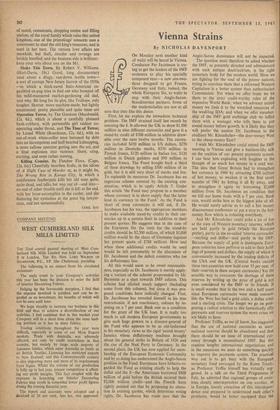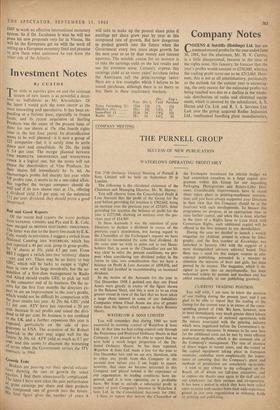Vienna Strains
By NICHOLAS DAVENPORT First, let me explain the immediate technical problem. The IMF strained itself last month by rescuing the £. It allowed the UK to draw $1,500 million in nine different currencies and gave it a stand-by credit of $500 million in addition draw- able over the next twelve months. The curren- cies included $450 million in US dollars, $270 million in Deutsche marks, $270 million in French francs, $120 million in Italian lire, $120 million in Dutch guilders and $90 million in Belgian francs. The Fund bought back a third of these drawings by selling $500 million of its gold, but it is still very short of marks and lire. To replenish its resources Dr. Jacobsson has an ingenious scheme covered by the existing con- stitution, which is to apply Article 7. Under this article 'the Fund may propose to a member whose currency is in short supply that the latter lend its currency to the Fund.' As the Fund is short of most currencies it will ask, if Dr. Jacobsson has his way, the appropriate members to make available stand-by credits in their cur- rencies up to a certain limit in addition to their present quotas. He suggests that in the case of the European Six the limit for the stand-by credits should be $2,500 million, of which $1,000 million would be the share of Germany (against her present quota of $788 million). How and when these additional credits would be used would be left presumably to the discretion of Dr. Jacobsson and the deficit countries who toe his deflationary line.
All this would seem to be sweet reasonable- ness, especially as Dr. Jacobsson is merely apply- ing a variant of the scheme propounded by Dr. Bernstein as a start towards IMF reform. This scheme had elicited much support (including some from this column), but since it was pro- posed conditions have radically changed. First, Dr. Jacobsson has revealed himself in his true restrictionist, if not reactionary, colours by in- sisting on a 7 per cent. Bank rate as a condition for the grant of the UK loan. It is really too much to ask modern European governments to give such huge powers to a director-general of the Fund who appears to be as old-fashioned in his monetary views as the rigid 'sound money' fanatics whose deflationary madness ,brought about the general strike in Britain of 1926 and the rise of the Nazi Party in Germany. In the second place, the UK has now applied for mem- bership of the European Economic Community and by so doing has undermined the Anglo-Saxon position in the Fund. Europeans have hitherto re- garded the Fund as existing chiefly to help the dollar and the £—the Americans borrowed $800 million of gold before the British secured their $2,000 million credit—and the French have rightly pointed out that by proposing no altera- tion in existing quotas, which determine voting rights. Dr. Jacobsson has made sure that the
Anglo-Saxon dominance will not be impaired.
The question must therefore be asked whether the IMF, as presently directed and administered with such antique doctrinairism, is the right monetary body for the modern world. Here we are fighting for the soul of the poorer nations, trying to convince them that a reformed Western Capitalism is a better system than authoritarian Communism. Yet when we offer loans we tie them to the strict credit-worthy rules of the expensive World Bank; when we advance untied money we limit it to the wretched resources of the weakling IDA; and when we offer member- ship of the IMF gold exchange club we inflict them with a manager who tells them to put sound money before growth. Is it likely that they will prefer the austere Dr. Jacobsson to the ebullient Mr. Khrushchev—the dear-money West to the cheap-money East?
I wish Mr. Khrushchev could attend the IMF meeting in Vienna and give a business-like talk on the realities of our present payments system, can hear him exploding with laughter at the thought of so much hot money in a cold war. The idea that Great Britain had to strengthen her currency in 1960 by attracting £700 million of hot money, to weaken it in the first seven months of 1961 by letting it all fly away, and to strengthen it again by borrowing $2,000 million from Dr. Jacobsson on condition that we kill our home trade with a 7 per cent. Bank rate, would strike him as the biggest joke of all He would surely advise us to call a hot money disarmament conference or put a stop to the hot money flow which is irritating everybody.
And Mr. Khrushchev could poke a lot of fun at the state of Western monetary reserves, which are held partly in gold (which the Russians prefer), partly in the so-called 'reserve currencies' —sterling and dollar—and partly in the IMF. Because the supply of gold is inadequate Euro- pean countries have perforce to add to their hold- ings of pounds and dollars, the supply of which is conveniently increased by the trading deficits of the USA and the UK. (Central banks outside these two countries now hold over 55 per cent. of their reserves in these suspect currencies.) Yet the sensible way to overcome the shortage of these reserves by writing up the price of gold is not even considered by the IMF or its friends. It is small wonder that in the two and a half years since European currencies were made convert- ible the West has had a gold crisis, a dollar crisis and a sterling crisis. The longer we go on post- poning a radical solution to this fantastically silly payments and reserves system 'the more crises we are likely to have.
Professor Triffin, as we all know, has suggested that the use of national currencies as inter- national reserves should be abandoned and that there should be an issue of international cur- rency through a reconstituted IMF. But this requires lengthy international negotiations and in the meantime we must do something quicklY to improve the payments system. The practical way out is to get busy with the European monetary fund envisaged by the Rome Treaty, as Professor Triffin himself has virtually sug- gested. In a talk on the Third Programme ia July, he admitted that regional groups of coun- tries closely interdependent on one another, as in Europe, keenly conscious of this interdepen- dence and prepared to understand each other s problems, would be better equipped than the
IMF to work an effective international monetary System . So if Dr. Jacobsson is wise he will not Press his new proposals very far in Vienna. He Will let the Europeans get on with the work of setting up a European monetary fund and promise to give them what assistance he can from the Other side of the Atlantic.



































 Previous page
Previous page